2018年职称英语考试非谓语动词的句法
- 格式:docx
- 大小:14.10 KB
- 文档页数:3
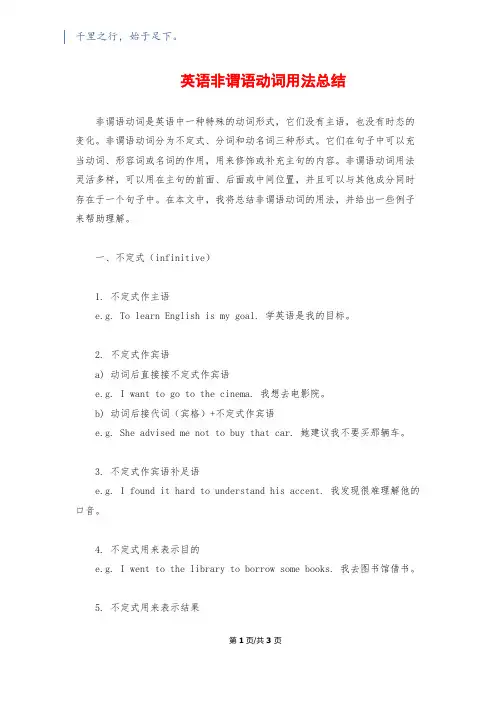
千里之行,始于足下。
英语非谓语动词用法总结非谓语动词是英语中一种特殊的动词形式,它们没有主语,也没有时态的变化。
非谓语动词分为不定式、分词和动名词三种形式。
它们在句子中可以充当动词、形容词或名词的作用,用来修饰或补充主句的内容。
非谓语动词用法灵活多样,可以用在主句的前面、后面或中间位置,并且可以与其他成分同时存在于一个句子中。
在本文中,我将总结非谓语动词的用法,并给出一些例子来帮助理解。
一、不定式(infinitive)1. 不定式作主语e.g. To learn English is my goal. 学英语是我的目标。
2. 不定式作宾语a) 动词后直接接不定式作宾语e.g. I want to go to the cinema. 我想去电影院。
b) 动词后接代词(宾格)+不定式作宾语e.g. She advised me not to buy that car. 她建议我不要买那辆车。
3. 不定式作宾语补足语e.g. I found it hard to understand his accent. 我发现很难理解他的口音。
4. 不定式用来表示目的e.g. I went to the library to borrow some books. 我去图书馆借书。
5. 不定式用来表示结果第1页/共3页锲而不舍,金石可镂。
e.g. She was too tired to continue working. 她太累了,无法继续工作。
6. 不定式用来表示原因e.g. He called me to apologize. 他打电话给我道歉。
7. 不定式用来表示方式e.g. She danced gracefully to the music. 她优雅地随着音乐跳舞。
二、分词(participle)1. 现在分词(-ing形式)a) 分词作定语,修饰名词e.g. The running dog is mine. 那只奔跑的狗是我的。

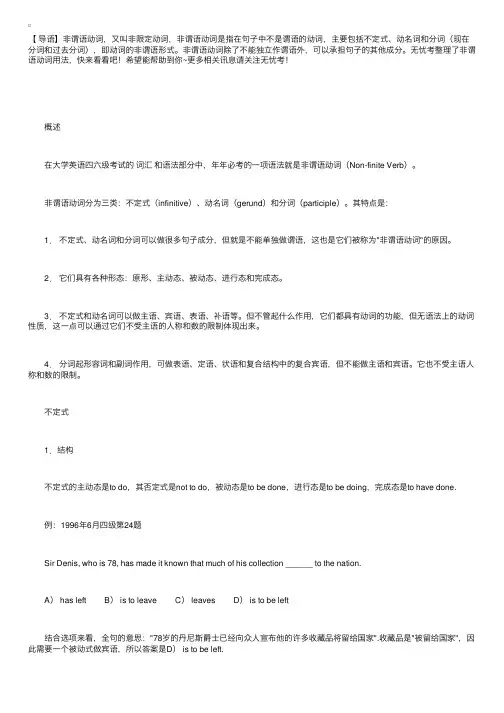
【导语】⾮谓语动词,⼜叫⾮限定动词,⾮谓语动词是指在句⼦中不是谓语的动词,主要包括不定式、动名词和分词(现在分词和过去分词),即动词的⾮谓语形式。
⾮谓语动词除了不能独⽴作谓语外,可以承担句⼦的其他成分。
⽆忧考整理了⾮谓语动词⽤法,快来看看吧!希望能帮助到你~更多相关讯息请关注⽆忧考! 概述 在⼤学英语四六级考试的词汇和语法部分中,年年必考的⼀项语法就是⾮谓语动词(Non-finite Verb)。
⾮谓语动词分为三类:不定式(infinitive)、动名词(gerund)和分词(participle)。
其特点是: 1.不定式、动名词和分词可以做很多句⼦成分,但就是不能单独做谓语,这也是它们被称为"⾮谓语动词"的原因。
2.它们具有各种形态:原形、主动态、被动态、进⾏态和完成态。
3.不定式和动名词可以做主语、宾语、表语、补语等。
但不管起什么作⽤,它们都具有动词的功能,但⽆语法上的动词性质,这⼀点可以通过它们不受主语的⼈称和数的限制体现出来。
4.分词起形容词和副词作⽤,可做表语、定语、状语和复合结构中的复合宾语,但不能做主语和宾语。
它也不受主语⼈称和数的限制。
不定式 1.结构 不定式的主动态是to do,其否定式是not to do,被动态是to be done,进⾏态是to be doing,完成态是to have done. 例:1996年6⽉四级第24题 Sir Denis, who is 78, has made it known that much of his collection ______ to the nation. A) has left B) is to leave C) leaves D) is to be left 结合选项来看,全句的意思:"78岁的丹尼斯爵⼠已经向众⼈宣布他的许多收藏品将留给国家".收藏品是"被留给国家",因此需要⼀个被动式做宾语,所以答案是D) is to be left. 2.不定式做主语 例:1995年1⽉四级第55题 It is not unusual for workers in that region _________. A) to be paid more than a month later B) to be paid later than more a month C) to pay later than a month more D) to pay later more than a month it 在句中作形式主语。

2018高考英语非谓语动词专项讲解练习第五章非谓语动词【非谓语动词作状语】一.不定式,分词作状语的基本原则不定式,分词作状语时,不定式,分词的逻辑主语必须与句子的主语保持一致,即不定式,分词作状语时必须和句子的主语保持一致,即不定式,分词作状语时必须和句子主语含有逻辑上的主动或被动关系,否则一般不能使用不定式,分词作状语.二.不定式作状语1.不定式作目的状语不定式作目的状语的情况比较多,如果强调目的性时,不定式前还可加in order或so as,构成"in order to do"或"so as to do"结构."in order to do"结构作目的状语时,可以放在句首也可放在句中;"so as to do"结构只能放在句中.Her mother plans to fly to Beijing at least four times a year(so as/in order)to visit her.Bob took down my telephone number so as/in order not to forge t it.2.不定式作结果状语不定式作结果状语常用在下列句式中:so...as to;such...as to;...enough to;only to(常表示以外的或事与愿违的结果);too...to等.I'm not so stupid(a fool)as to write it down.Jane hurried back only to find that her mother had left.I'm too tired to stay up longer.备注:在only too..to结构中,too...to...并非是"太....而不能..."之意.此时,与too..to..搭配的形容词常见的有pleased,ready,willing,glad,happy等.I'm only too glad to have passed the exam.3.不定式作原因状语形容词作表语时,后面可接不定式作原因状语,用以说明产生这种情绪的原因.用于这类结构中的形容词常见的有:happy,glad,sorry,anxious,proud,disappointed,angry,surprised,ready,delighted,pleased等.You will never know how happy I was to see her yesterday.4.在"主语+系动词+表语(形容词)+to do"结构中,句子的主语与动词不定式有逻辑上的被动关系,且形容词表示主语的特征或性质,这时,需用不定式的主动形式表示被动意义.该结构中常用的形容词有:easy,hard,difficult,important,impossible,interesting,pleasant,nice,comfortable,safe,dangerous等.This question is easy to answer.This book is difficult to understand.三.分词作状语1.分词作状语时其形式的选择2.分词作状语的句法功能分词作状语时,可以表时间,原因,结果,条件,让步,行为方式,伴随状况等.为了强调,还可与while,when,once,if,unless等连词连用.When offered help,one often says"Thank you"or "It's kind of you".(时间)Separated from other continents for millions of years,Australia has many plants and animals not found in any other country in the world.(原因)Generally speaking,if taken according to the directions,the drug has no side effect.(条件)He glanced at her,nothing that though she was tiny,she seemed very well.(结果)Having been told many times,he still repeated the same mistake.(让步)The teacher came into the lab,followed by some students.(伴随)四.独立成分作状语有些分词或不定式短语作状语,其形式的选择不受上下文的影响,称作独立成分.常见的有:generallyspeaking一般来说;frankly speaking坦白地说;judging from/by...根据....来判断;considering.../taking....into consideration考虑到.....;to tell you the truth说实话;compared to/with与....相比.Judging from his accent,he is from Hong Kong.Considering your health,you'd better have a rest.To tell you the truth,I am a little tired.五.独立主格结构非谓语动词作状语时,它的逻辑主语应和句子主语保持一致.但有时非谓语动词带有自己的逻辑主语,在句子中作状语,我们称之为独立主格结构.独立主格结构的特点:①独立主格结构的逻辑主语与句子的主语不同,它独立存在.②独立主格结构中作逻辑主语的名词或代词与后面的分词或不定式是逻辑上的主动或被动关系.③独立主格结构一般有逗号与句子分开.独立主格结构的构成:①名词/代词+分词②名词/代词+不定式③with/without+名词/代词+分词/不定式The test finished(=When the test was finished),we began our holiday.The president assassinated(=Because the president was assassinated),the whole country was in deep sorrow. Weather permitting(=If weather permits),we are going to visit you tomorrow.I stood before her with my heart beating fast.【练一练】①Anxiously,she took the dress out of the package and tried it on,only (find)it didn't fit.②Clearly and thoughtfully (write),the book inspires confidence in students who wish to seek their ownanswers.③Group activities will be organized after class (help)children develop team spirit.④ (spend)the past year as an exchange student in Hong Kong,Linda appears more mature than those of herage.⑤The lecture (give),a lively question-and-answer session followed.【非谓语动词作定语】一.不定式作定语1.作定语的不定式如果是不及物动词,或者不定式所修饰的名词或代词是不定式动作的地点,工具等,不定式后面需有相应的介词.The Browns have a comfortable house to live in.He had no place to live.2.用不定式作定语的几种情况:①不定式表将来The car to be bought is for his sister.②用来修饰被序数词,最高级或no,all,any等限定的中心词,且与中心词为逻辑上的主动关系.He was the best man to do the job.She was the first woman to win the gold medal in the Olympic Games.③有些名词的同根词常跟不定式,因而它们也常跟不定式作定语,常见的有:promise,plan,attempt,offer,decision,refusal,failure,ability,chance,warning,anxiety,eagerness,willingne ss,readiness等.I don't trust his promise to come for a visit.He said he had no plans to go there.He made an attempt to stand up.二.分词作定语1.作定语的及物动词的分词形式为:v-ing,being+过去分词和过去分词.当被修饰的名词与非谓语动词为主动关系时,用v-ing;当被修饰的名词与非谓语动词为被动关系且表正在进行时,用being+过去分词;当被修饰的名词与非谓语动词为被动关系且表完成时,用过去分词.The houses being built are for the teachers.(被动,正在进行)2.作定语的不及物动词的分词形式为:v-ing和过去分词.v-ing表示正在进行;过去分词表示已经完成.boiling water沸腾的水(表示正在进行)boiled water白开水(表完成)falling leaves正在下落的叶子(表正在进行)fallen leaves已经落下的叶子(表完成)developing countries发展中国家(表正在进行)developed countries发达国家(表完成)三.to be done,done和being done作定语的区别to be done表被动,将来;done表被动,完成;being done表被动,正在进行.Have you read the novel written by Dickens?(表被动,完成)Listen!The song being sung is very popular with the students.(表被动,正在进行)The question to be discussed at tomorrow's meeting is very important.(表被动,将来)【练一练】①There are still many problems (solve)before we are ready for a long stay on the Moon.②Prices of daily goods (buy)through a computer can be lower than store prices.③The flowers (smell)sweet in the botanic garden attract the visitors to the beauty of nature.【非谓语动词作宾语,补语,主语,表语】一.非谓语动词(不定式,动名词)作宾语1.下列动词一般用不定式作宾语,请牢记下面的口诀:决心学会想希望,拒绝设法愿假装.主动答应选计划,同意请求帮一帮.decide/determine,learn,want,expect/hope/wish;refuse,manage,care,pretend;offer,promise,choose,plan;agree,ask/beg,help.She pretended not to see me when I passed by.We agreed to meet here but so far she hasn't turned up yet.此外,afford,strive,happen,wait,threaten等也要用不定式作宾语.2.下列动词或词组一般用动名词作宾语,请牢记下面的口诀:考虑建议盼原谅,承认推迟没得想.避免错过继续练,否认完成就欣赏.禁止想象才冒险,不禁介意准逃亡.consider,suggest/advise,look forward to,excuse/pardon;admit,delay/put off,fancy(想象,设想);avoid,miss,keep/keep on,practice;deny,finish,enjoy/appreciate;forbid,imagine,risk;can't help(禁不住),mind,allow/permit,escape.He got well-prepared for the job interview,for he couldn't risk losing the good opportunity.此外,be used/accustomed to,lead to,devote to,go back to,stick to,object to,get down to,pay attention to,can'tstand(无法忍受),give up,feel like,insist on,be busy,have difficulty(in),have a good/wonderful/hard time(in),spend time (in)等短语后也要用动名词作宾语.3.下列动词或词组既可以跟动名词作宾语,也可以跟不定式作宾语,但意义上有区别,要特别注意.to do sth.忘记要做某事forgetdoing sth.忘记已经做过某事to do sth.记着要做某事rememberdoing sth.记得曾经做过某事to do sth.努力做某事regretdoing sth.后悔做过某事to do sth.努力做某事trydoing sth.试着做某事to do sth.打算做某事meandoing sth.意味着做某事4.在动词allow,advise,forbid,permit,consider后直接跟动名词作宾语;如果后面有名词或代词作宾语,则用动词不定式作宾语补足语sb.to do sth.allow/permit/forbid/advise/considerdoing sth.Smoking is forbidden here so we don't allow you to smoke.We don't allow smoking in the wall.5.动词need,require,want作"需要",deserve作"应受,应得"解时,其后用动名词的主动形式(doing)或不定式的被动形式(to be done)表被动意义.be worth后用动名词的主动形式(doing)表示被动意义, 而worthy则需用被动形式.此外,need,require,want后可以接名词或代词作宾语,然后接不定式作宾语补足语,表示"需要/要求/想要某人做某事".to be done需要)sb.to do sth.(需要/要求/想要)名词deserve doingto be done名词be worth doingto be donebe worthy名词(表钱数或表价格的名词除外)ofbeing doneto be cleanedThe window needs/requires/wantscleaningworth visitingto be visitedThis place is worthya visitofbeing visitedconsideringThese proposals deserveto be considered6.不定式作动词(词组)tell,show,understand,explain,teach,learn,advise,discuss,ask,decide,wonder,find out等的宾语时,前面常带引导词how,what,whether,where,when,who等,但why后加不带to的不定式.备注:此用法中的不定式的逻辑主语需与句子的主语或宾语保持一致,否则用宾语从句.He showed us how to do the work.(=He showed us how we should do the work)I don't know what to do.(=I don't know what I should do.)We must decide whether to stay or go.(=We must decide whether we'll stay or go)Can you tell me why do it?①The film star wears sunglasses.Therefore,he can go shopping without (recognize).②One learns a language by making mistakes and (correct)them.③In some parts of London,missing a bus means (wait)for another hour.二.非谓语动词作补语1.后接不定式作补语的动词及动词词组advise,allow,ask,beg,cause,encourage,expect,forbid,force,get,intend,invite,love,order,persuade,prefer,remind,require,tea ch,tell,want,warn,wish,wait for,call on,depend on等.You are not allowed to smoke here.The doctor warned him not to eat too much meat.注意:think,consider,believe,suppose,feel,find,imagine,prove,appoint,judge等后常用"to be..."作宾补/主补People considered him to be a great leader.They found the answer to be quite satisfactory.Chinese food is considered to be the healthiest in the world.He imagines himself to be an able man.2.非谓语动词作感官动词(词组),使役动词的宾补listen to,feel的宾语补足语有四种形式,以see为例:doing sth.看见....正做....(宾语与宾补为逻辑上的主动关系)do sth.看见...做了....see+宾语+ being done看见....正在做(宾语与宾补为逻辑上的被动关系)done看见....被做I heard her sing an English song just now.(主动,完成)I heard her singing an English song when I passed by her room yesterday.(主动,正在进行)I heard an English song being sung by the little girl when I passed by her room yesterday.(被动,正在进行)I'd like to see the plan carried out.(被动,没有一定的时间性)2.使役动词make,let,have,get后接复合宾语的情况.do让...做....(宾语与宾补为逻辑上的主动关系)①make+宾语+done让...被做(宾语与宾补为逻辑上的被动关系)He made his workers work 12 hours a day.He tried to make himself understood.do让.....做.....(宾语与宾补为逻辑上的主动关系)②let+宾语+be done让....被做(宾语与宾补为逻辑上的被动关系)Don't let your child play with matches.Let the work be done immediately.do sth....做某事使....持续做某事 (宾语与宾补为逻辑上的主动关系)③have+宾语+done使....被做(宾语与宾补为逻辑上的被动关系)备注:⑴.have sth. done还表示"使....遭受..."之意Tom had his leg broken while playing football.Mr.Smith had his house broken into while he was away on holiday.⑵have sb. doing常用于否定句中,其中have有"允许,容忍"之意.I won't have you speaking to your dad like that.⑶have还可用于have sth. to do结构,该结构中have作"有"讲,不定式作定语.I have something urgent to inform you.to do sth.使....做doing sth.使...做 (宾语与宾补为逻辑上的主动关系)⑷.get+宾语+done使....被做(宾语与宾补为逻辑上的被动关系)He got me to post the letter for him.The captain got the soldiers moving toward the front after a short rest.I'll get my bike repaired tomorrow.3.下列动词(词组)在主动语态中用不带to的不定式作宾语补足语,但在被动语态中要加上to;它们是"吾看三室两厅一感觉"-5看(look at,see,watch,notice,observe);3使(make,let,have);2听(listen to,hear);1感觉(feel)Someone was heard to come up the stairs.(三)动词leave,keep,find,catch及介词with后加非谓语动词作复合宾语的情况:sb./sth. doing sth.让某人/物一直处于某种状态(宾语与宾语补足语之间是逻辑上的主动关系,表示动作正在进行)sth. undone留下某事未做(宾语与宾语补足语之间是逻辑上的被动关系,表示被动和完成,一般以undone,unfinished,unsettled,untouched为多)1.leavesb. To do sth.让某人去做某事(不定式表示将来的动作)sth. To be done.留下某事要做It's wrong to leave the machine running.(主动,正在进行)The guests left most of the dishes untouched,because they didn't taste delicious.(被动,完成)He left,leaving me to do all the rest work.(主动,将来)We hurriedly ended our meeting,leaving many problems to be settled.(被动,将来)sb./sth. doing使某人/物一直做某事2.keepsb./sth. done使某人/物被......(表示被动且完成,或表示状态)Keep the engine running.You should keep me informed of his whereabouts.sb. doing发现某人正在做某事3.find sb/sth. done发现某人/物.....(表完成或状态)sb./sth.(to be)...发现某人/物....We found him(to be)dishonest.Often I found her quietly weeping alone.I found him buried in a novel.4.catch sb. doing sth.撞见某人正在做某事I caught John reading my private letters.sb./sth. doing(表主动且进行,或表特征)sth. being done(表被动且进行)5.with sth. done(表被动且完成,或表状态)sth. to do(表示将来)John received an invitation to dinner,and with his work finished,he gladly accepted it.With a lot of difficult problems to settle,the newly elected president is having a hard time.(四)常用不定式作主语补足语的句型Sb. be said/believed/known/supposed/reported/considered/found/thought+to do/to have done/to be done/to have been done+其他.He is said to have gone abroad.(=It is said that he has gone abroad.)Heat is considered to be a form of energy.Y ou're supposed to pay the bill by Friday.④The managers discussed the plan that they would like to see (carry)out the next year.⑤The missing boy was last seen (play)near the East Lake.【非谓语动词作主语,表语】(一)非谓语动词(不定式,动名词)作主语1.不定式,动名词都可作主语,但动名词作主语多指抽象的,概念性的动作,可以是多次的,经常性的行为;不定式作主语多表示具体的动作,尤其是某一次的动作.with fire is dangerous.(泛指玩火)To play with fire will be dangerous.(指一次具体的动作)2.下列句型中常用动名词作主语.no use/goodnot any use/goodIt is/was+ +doing sth.of little use/good worthIt is worth making an appointment before you go.3."Wh-+不定式"可作主语When to leave hasn't been decided yet.Whether to drive or take the train is still a question.(二)非谓语动词(不定式,动名词,分词)作表语1.不定式,动名词都可作表语,但动名词作表语多指抽象的,概念性的动作,可以是多次的,经常性的行为;不定式作表语多表示具体的动作,尤其是某一次的动作.His favorite sport is swimming.(泛指游泳)Your task today is to wash the curtains.(指一次具体的动作)2.现在分词,过去分词都可作表语,但现在分词用来说明主语的特征,意为:令人.....的;过去分词用来说明主语的状态,意为:感到....的.The film is exciting.He is excited at the news.3.非谓语动词作remain的表语⑴remain作"仍需去做(或说,处理)"讲,后面加"to be done"作表语One problem remains to be solved.It remains to be seen whether the operation was successful.⑵remain作"仍然是"讲,后面可加现在分词或过去分词作表语.She remained standing though we repeatedly asked her to sit down.The true author of the book remains unknown.⑥It's standard practice for a company like this one (employ)a security officer.⑦As we joined the big crowd I got (separate)from my friends.⑧The pilot asked all the passengers on board to remain (seat)as the plane was making a landing.【练习】【非谓语动词作状语】1. (catch)the early flight,we ordered a taxi in advance and got up very early.2.Much time (spend)sitting at a desk,office workers are generally troubled by health problems.3. (absorb)in painting,John didn't notice evening approaching.4. (work)for two days,Steve managed to finish his report on schedule.5. (learn)more about Chinese culture,Jack has decided to take Chinese folk music as an elective course.6.When the clerk saw a kind face wrinkled in an apologetic smile,she stood rooted to the ground,(wonder)whether to stay or leave.7.Sometimes I act as a listening ear for fellow students (talk)over what is bothering them.8.Like ancient sailors,birds can find their way (use)the sun and the stars.9. (raise)in the poorest area of Glasgow,he had a long,hard road to becoming a football star.10.Children,when (accompany)by their parents,are allowed to enter the stadium.11.There is no greater pleasure than lying on my back in the middle of the grassland, (stare)at the night sky.12. (free)ourselves from the physical and mental tensions,we each need deep thought and inner quietness.13. (work)out the difficult maths problem,I have consulted Professor Russell several times.14.I hope to take the computer course.Good idea. (find)out more about it,visit this website.15.A good listener takes part in the conversation, (offer)ideas and raising questions to keep the talk flowing.16.I got to the office earlier that day, (catch)the 7:30 train from Paddington.17. (eat)at the cafeteria before,Tina didn't want to eat there again.精品文档18.I stopped the car (take)a short break as I was feeling tired.19.The sunlight is white and blinding, (throw)hard-edged shadows on the ground.20.Lionel Messi, (set)the record for the most goals in a calendar year,is considered the most talented footballplayer in Europe.21.The sun began to rise in the sky, (bathe)the mountain in golden light.22. (stay)warm at night,I would fill the woodstove,then set my alarm clock for midnight so I could refill it.23. (found)in the early 20th century,the school keeps on inspiring children's love of art.24.The old man sat in front of the television every evening,happy (watch)anything that happened to be on.25.When (ask)for his views about his teaching job,Philip said he found it very interesting and rewarding.26. (use)with care,one tin will last for six weeks.27. (base)an important decision more on emotion than on reason,you will regret it sooner or later.28.He got up late and hurried to his office, (leave)the breakfast untouched.29. (ask)to work overtime that evening,I missed a wonderful film.30.Sit down,Emma.You will only make yourself more tired, (keep)on your feet.【非谓语动词作定语】1.The park was full of people, (enjoy)themselves in the sunshine.2.Amie Salmon,disabled,is attended throughout her school days by a nurse (appoint)to guard her.st night,there were millions of people (watch)the opening ceremony live on TV.4.There's a note pinned to the door (say)when the shop will open again.5.The producer comes regularly to collect the cameras (return)to our shop quality problems.6.Today there are more airplanes (carry)more people than ever before in the skies.7.V olunteering gives you a chance (change)lives,including your own.8.In some languages,100 words make up half of all words (use)in daily conversations.9.The room is empty except for a bookshelf (stand)in one corner.ura was away in Paris for over a week.When she got home,there was a pile of mail (wait)for her.11.You cannot accept an opinion (offer)to you unless it is based on facts.12.The airport (complete) next year will help promote tourism in this area.13.The witnesses (question)by the police just now gave very different descriptions of the fight.14.Bird's singing is sometimes a warning to other birds (stay)away.15.The lecture, (start)at 7:00 pm last night,was followed by an observation of the moon with telescopes.【非谓语动词作宾语,补语,主语,表语】1.Listening to music at home is one thing,going to hear it (perform)live is quite another.2. (ignore)the difference between the two research findings will be one of the worst mistakes you make.3.Back from his two-year medical service in Africa,Dr.Lee was very happy to see his mother (take)good careof at home.4.For those with family members far away,the personal computer and the phone are important in staying(connect).5.While waiting for the opportunity to get (promote),Henry did his best to perform his duty.6.The manager was satisfied to see many new products (develop)after great effort.7.It's quite hot today.Do you feel like (go)for a swim?8. (understand)your own needs and styles of communication is as important as learning to conveyyour affection and emotions.9. (hear)how others react to the book you have just read creates an added pleasure.10.The engine just won't start.Something seems (go)wrong with it.11.When we saw the road (block)with snow,we decided to spend the holiday at home.12.Shortly after suffering from a massive earthquake and (reduce)to ruins,the city took on a new look.13.Let those in need (understand)that we will go all out to help them.14.I remembered (lock)the door before I left the office,but forgot to turn off the lights.15.One learns a language by making mistakes and (correct)them.16.China recently tightened its waters controls near the Huangyan Island to prevent Chinese fishing boatsfrom (attack)in the South China Sea.17.We've had a good start,but next,more work needs (do)to achieve the final success.18.The old couple often take a walk after supper in the park with their pet dog (follow)them.19.Having finished her project,she was invited by the school (speak)to the new students.20.It's important for the figures (update)regularly.收集于网络,如有侵权请联系管理员删除。
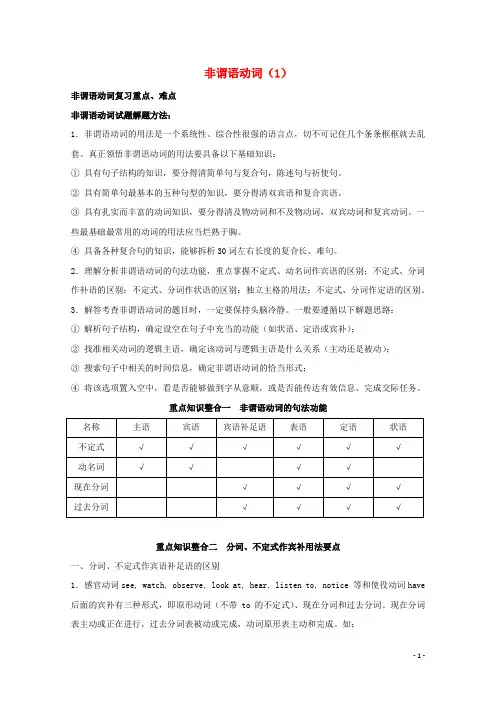
非谓语动词(1)非谓语动词复习重点、难点非谓语动词试题解题方法:1.非谓语动词的用法是一个系统性、综合性很强的语言点,切不可记住几个条条框框就去乱套。
真正领悟非谓语动词的用法要具备以下基础知识:①具有句子结构的知识,要分得清简单句与复合句,陈述句与祈使句。
②具有简单句最基本的五种句型的知识,要分得清双宾语和复合宾语。
③具有扎实而丰富的动词知识,要分得清及物动词和不及物动词,双宾动词和复宾动词。
一些最基础最常用的动词的用法应当烂熟于胸。
④具备各种复合句的知识,能够拆析30词左右长度的复合长、难句。
2.理解分析非谓语动词的句法功能,重点掌握不定式、动名词作宾语的区别;不定式、分词作补语的区别;不定式、分词作状语的区别;独立主格的用法;不定式、分词作定语的区别。
3.解答考查非谓语动词的题目时,一定要保持头脑冷静。
一般要遵循以下解题思路:①解析句子结构,确定设空在句子中充当的功能(如状语、定语或宾补);②找准相关动词的逻辑主语,确定该动词与逻辑主语是什么关系(主动还是被动);③搜索句子中相关的时间信息,确定非谓语动词的恰当形式;④将该选项置入空中,看是否能够做到字从意顺,或是否能传达有效信息、完成交际任务。
重点知识整合一非谓语动词的句法功能重点知识整合二分词、不定式作宾补用法要点一、分词、不定式作宾语补足语的区别1.感官动词see, watch, observe, look at, hear, listen to, notice 等和使役动词have 后面的宾补有三种形式,即原形动词(不带to 的不定式)、现在分词和过去分词。
现在分词表主动或正在进行,过去分词表被动或完成,动词原形表主动和完成。
如:I heard her sing an English song just now.刚才我听见她唱了一首英文歌。
I heard her singing an English song when I passed by her room yesterday.昨天经过她房间时,我听见她在唱英文歌。

非谓语动词的用法总结非谓语动词是英语中的一种特殊动词形式,它可以在句子中作多种不同的成分,包括名词、形容词、副词等。
非谓语动词包括不定式、动名词和分词三种形式,它们在句子中的使用方式和作用各不相同。
下面我们来总结一下非谓语动词的用法。
首先,不定式是非谓语动词中的一种形式,它通常由“to + 动词原形”构成。
不定式可以作主语、宾语、定语、状语等成分。
例如,To learn English well is my goal.(学好英语是我的目标。
)I want to visit Beijing next month.(我想下个月去北京。
)在这两个例句中,不定式分别作主语和宾语。
其次,动名词是非谓语动词中的另一种形式,它是动词+ing形式。
动名词可以作主语、宾语、定语、状语等成分。
例如,Swimming is good for health.(游泳对健康有益。
)I enjoy reading books in my spare time.(我喜欢在空闲时间看书。
)在这两个例句中,动名词分别作主语和宾语。
最后,分词是非谓语动词中的第三种形式,它分为现在分词和过去分词两种形式。
分词可以作定语、状语等成分。
例如,The girl standing there is my sister.(站在那里的女孩是我妹妹。
)He was surprised by the news.(他对这个消息感到吃惊。
)在这两个例句中,分词分别作定语和状语。
总的来说,非谓语动词在句子中的作用多种多样,可以根据具体情况来灵活运用。
在使用非谓语动词时,需要注意与主句的逻辑关系,保持句子结构的平衡和连贯。
希望以上总结对大家在学习和运用非谓语动词时有所帮助。

非谓语动词语法非谓语动词是一种不带有主语和谓语的动词形式,通常可以作为名词、形容词或副词的补语或修饰语。
下面是非谓语动词的三种形式以及它们的用法。
1. 动词不定式动词不定式是由“to”加上动词原形构成的。
它可以作为主语、宾语、宾语补足语、表语、定语、状语等。
例如:主语:To learn a new language is always beneficial.宾语:I want to travel to Japan next year.宾语补足语:The teacher asked the students to complete the homework.表语:My dream is to become a famous singer.定语:She is the first person to arrive at the party.状语:He ran fast to catch the train.2. 现在分词现在分词是由动词原形加上-ing构成的。
它可以作为形容词、动词、定语或状语等。
例如:形容词:The boring movie put me to sleep.动词:He is always eating chips during class.定语:I saw a woman carrying a baby.状语:Walking along the beach, I saw a beautiful sunset.3. 过去分词过去分词是由动词原形加上-ed构成的。
它可以作为形容词、动词、定语或状语等。
例如:形容词:The damaged car cannot be driven.动词:I have never been to the United States.定语:The book written by Shakespeare is a classic.状语:Having finished the assignment, she went to bed early.总的来说,非谓语动词的适用范围非常广泛,使用非谓语动词可以让文章更加简洁明了,使得表达更为精准。
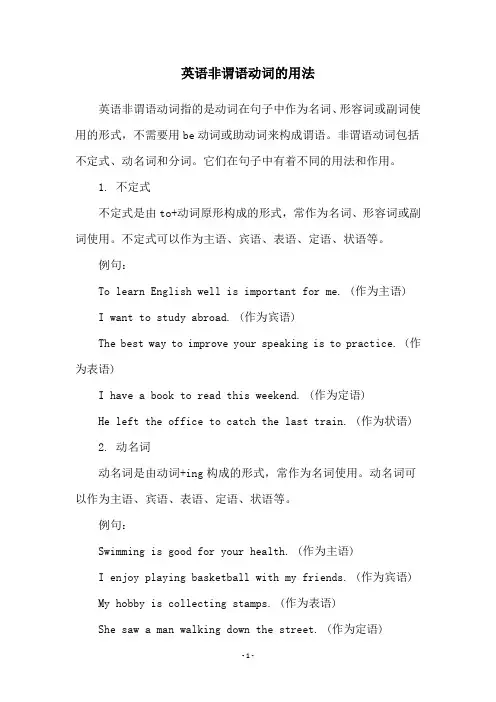
英语非谓语动词的用法英语非谓语动词指的是动词在句子中作为名词、形容词或副词使用的形式,不需要用be动词或助动词来构成谓语。
非谓语动词包括不定式、动名词和分词。
它们在句子中有着不同的用法和作用。
1. 不定式不定式是由to+动词原形构成的形式,常作为名词、形容词或副词使用。
不定式可以作为主语、宾语、表语、定语、状语等。
例句:To learn English well is important for me. (作为主语) I want to study abroad. (作为宾语)The best way to improve your speaking is to practice. (作为表语)I have a book to read this weekend. (作为定语)He left the office to catch the last train. (作为状语) 2. 动名词动名词是由动词+ing构成的形式,常作为名词使用。
动名词可以作为主语、宾语、表语、定语、状语等。
例句:Swimming is good for your health. (作为主语)I enjoy playing basketball with my friends. (作为宾语) My hobby is collecting stamps. (作为表语)She saw a man walking down the street. (作为定语)He did his homework while listening to music. (作为状语) 3. 分词分词有两种形式:现在分词和过去分词。
现在分词是由动词+ing 构成的形式,过去分词是由动词的过去分词形式构成的形式。
分词可以作为形容词和状语使用。
例句:The running man is my brother. (现在分词作为形容词)The broken vase is on the floor. (过去分词作为形容词)He left the room, closing the door behind him. (现在分词作为状语)Having finished his homework, he went to bed. (过去分词作为状语)总之,非谓语动词在英语中用法多样,需要根据具体情况来判断其作用和形式。

2018中考英语语法:并列连词和非谓语动词中考网为大家提供2018中考英语语法:并列连词和非谓语动词,更多中考英语复习资料请关注我们网站的更新!2018中考英语语法:并列连词和非谓语动词英语中的并列连词不多,常见的只有and, or, but, yet等,并且其用法也不复杂,在高考英语中直接考查并列连词用法的考题比较少见。
但是,这并不意味着你就可对并列连词“置之不理”,因为命题者虽然不会直接考查并列连词的用法,但他们却经常把并列连词作为一种设计陷阱题的工具,把一些本来很容易的考点设计成难题,甚至陷阱题。
本文拟就如何巧借并列连词破解非谓语动词难题或陷阱题作一分析。
一、借并列连词识别平行结构根据英语语法习惯,用并列连词连接的两个语法成分通常应是平行的、对等的。
若并列连词连接的是两个非谓语动词,原则上说它们应是同一形式——同为不定式,或同为-ing分词,或同为-ed分词。
如:Going to bed early and getting up early is a good habit. 早睡早起是一个好习惯。
Shops were open, especially places which sold things to eat and to drink. 店铺都开着,尤其是卖饮食的店铺。
To mean to do something and to do something actually are two different things. 打算做一件事和实际上做一件事完全是两回事。
有些用than连接的非谓语动词也往往需要一致的形式。
如:Friendship is like money: easier made than kept. 友谊像金钱——挣来容易维持难。
“Why don’t you get yourself a job?” “That’s easier said than done.” “你怎么不找个工作呢?”“说起来容易,找起来难哪!”请看一道高考题:It is worth considering what makes “convenience” foodsso popular, and _________ better ones of your own. (北京卷)A. introducesB. to introduceC. introducingD. introduced此题答案为C。
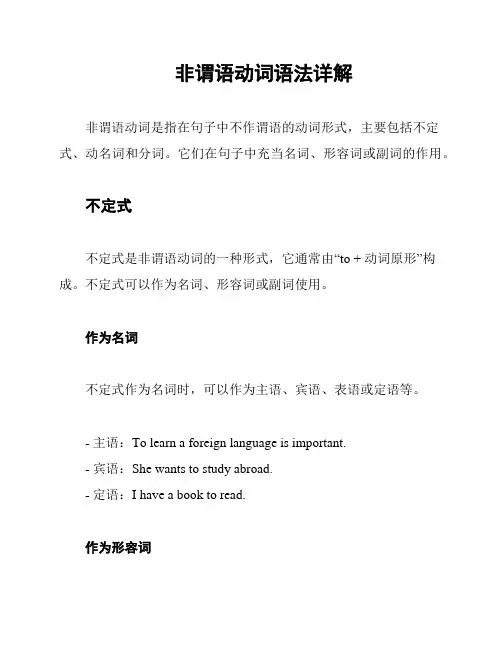
非谓语动词语法详解非谓语动词是指在句子中不作谓语的动词形式,主要包括不定式、动名词和分词。
它们在句子中充当名词、形容词或副词的作用。
不定式不定式是非谓语动词的一种形式,它通常由“to + 动词原形”构成。
不定式可以作为名词、形容词或副词使用。
作为名词不定式作为名词时,可以作为主语、宾语、表语或定语等。
- 主语:To learn a foreign language is important.- 宾语:She wants to study abroad.- 定语:I have a book to read.作为形容词不定式作为形容词时,可以修饰名词或代词。
- The best way to learn is to practice.- This is an easy question to answer.作为副词不定式作为副词时,可以修饰动词、形容词或副词。
- She ran fast to catch the bus.- He is too tired to continue.动名词动名词是非谓语动词的一种形式,它通常由动词的-ing形式构成。
动名词可以作为名词、形容词或副词使用。
作为名词动名词作为名词时,可以作为主语、宾语、表语或定语等。
- 主语:Swimming is my favorite sport.- 宾语:I enjoy reading books.- 表语:His hobby is playing the piano.- 定语:The running water sounds relaxing.作为形容词动名词作为形容词时,可以修饰名词或代词。
- I met a charming lady dancing on the stage.- The running water is cold.作为副词动名词作为副词时,可以修饰动词、形容词或副词。
- He answered while eating lunch.- She was driving cautiously.分词分词是非谓语动词的一种形式,分为现在分词和过去分词两种。
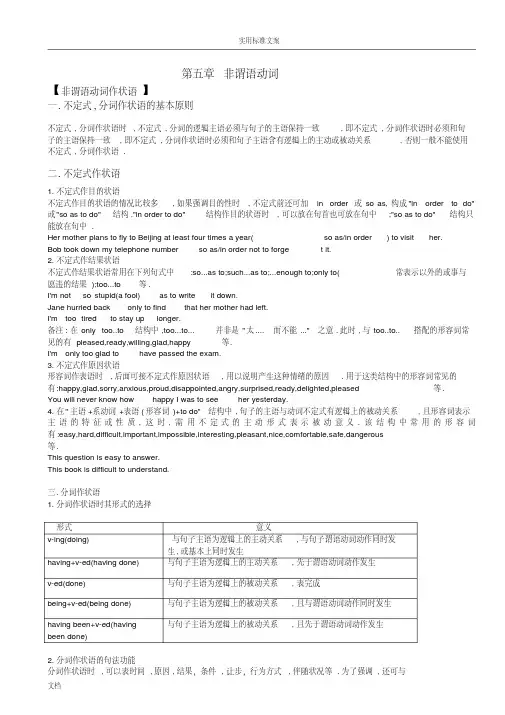
实用标准文案文档第五章非谓语动词【非谓语动词作状语】一.不定式,分词作状语的基本原则
不定式,分词作状语时,不定式,分词的逻辑主语必须与句子的主语保持一致,即不定式,分词作状语时必须和句子的主语保持一致,即不定式,分词作状语时必须和句子主语含有逻辑上的主动或被动关系,否则一般不能使用不定式,分词作状语.
二.不定式作状语1.不定式作目的状语不定式作目的状语的情况比较多,如果强调目的性时,不定式前还可加in order或so as,构成"in order to do"或"so as to do"结构."in order to do"结构作目的状语时,可以放在句首也可放在句中;"so as to do"结构只能放在句中. Her mother plans to fly to Beijing at least four times a year(so as/in order)to visit her. Bob took down my telephone number so as/in order not to forget it. 2.不定式作结果状语不定式作结果状语常用在下列句式中:so...as to;such...as to;...enough to;only to(常表示以外的或事与愿违的结果);too...to等. I'm not so stupid(a fool)as to write it down. Jane hurried back only to find that her mother had left. I'm too tired to stay up longer. 备注:在only too..to结构中,too...to...并非是"太....而不能..."之意.此时,与too..to..搭配的形容词常见的有pleased,ready,willing,glad,happy等. I'm only too glad to have passed the exam. 3.不定式作原因状语形容词作表语时,后面可接不定式作原因状语,用以说明产生这种情绪的原因.用于这类结构中的形容词常见的有:happy,glad,sorry,anxious,proud,disappointed,angry,surprised,ready,delighted,pleased等. You will never know how happy I was to see her yesterday. 4.在"主语+系动词+表语(形容词)+to do"结构中,句子的主语与动词不定式有逻辑上的被动关系,且形容词表示主语的特征或性质,这时,需用不定式的主动形式表示被动意义.该结构中常用的形容词有:easy,hard,difficult,important,impossible,interesting,pleasant,nice,comfortable,safe,dangerous等. This question is easy to answer. This book is difficult to understand.
秘笈05 非谓语动词非谓语动词主要包括不定式、动名词和分词。
非谓语动词一直是高考中的热点。
解答非谓语动词的题目时,一定要解析句子结构,确定所设空是谓语动词还是非谓语动词,以及非谓语动词在句子中充当的功能(如状语、定语或宾补);找准相关动词的逻辑主语,确定该动词与逻辑主语是什么关系(主动还是被动);搜索句子中相关的时间信息,确定非谓语动词的恰当形式。
非谓语题的解题总方法如下:1. 先看四个答案:如果四个答案分别为动词原形、不定式、现在分词、过去分词等情况,那么这个题多半是非谓语动词题。
2. 看符号:中间有个逗号,末尾有个句号(有时中间没有逗号);3. 看有没有连接词(引导词)。
如果用逗号隔开的两个部分都没有连接词的话,一部分是句子时,那么另一部分就一定是非句子,而非句子里的动词就是非谓语动词。
4. 定语态:如果本句的主语(或动词自带的逻辑主语)与它是逻辑上的主谓关系,那么答案一般用现在分词;如果本句的主语(或动词自带的逻辑主语)与它是逻辑上的动宾关系(被动关系),那么答案一般用过去分词。
5. 定时态:如果非谓语的动作比谓语先(或先很久)发生,那么非谓语动词要用完成式(to have done/to havebeen done/ having done/ Having been done),否则我们要用非谓语的一般式(to do / to be done / doing / beingdone / done)。
考点1 非谓语动词作主语、宾语和表语一、动名词和不定式作主语动名词作主语时通常位于句首;不定式作主语时常置于句末,用it 作形式主语放在句首。
▶Smoking is prohibited(禁止)here. (抽象)▶It is not very good for you to smoke so much. (具体)注意:①如果表语是不定式,主语也是不定式;表语是动名词,主语也是动名词。
如:▶To see is to believe.=Seeing is believing.②常用动名词作主语的句型:▶It’s no use co mplaining without taking action.不采取行动只是抱怨是没有用的。
非谓语动词的用法总结一、非谓语动词概述非谓语动词是指不具备谓语性质的动词形式,它以独立于主谓结构的方式出现在句子中。
在英语中,非谓语动词包括不定式、现在分词和过去分词。
本文将总结非谓语动词的用法,并重点讨论其作为状语、定语和补足语的功能。
二、不定式的用法1. 作为目的状语:不定式常用来表示动作或状态的目的。
例如:“I went to the store to buy some groceries.”(我去商店买些杂货)2. 作为结果状语:不定式有时表示某个动作或状态发生的结果。
例如:“He worked hard to climb the mountain.”(他努力工作才成功登上山顶)3. 作为原因状语:不定式可以用来表示某个行为或状态发生的原因。
例如:“She stayed up late to finish her homework.”(她熬夜完成家庭作业)4. 作为条件状语:在条件句中,常使用"if"引导一个带有不定式的从句。
例如:“If you want to succeed, you must work hard.”(如果你想成功,就必须努力工作)5. 作为名词性质:不定式可以充当名词的角色,用来作主语、宾语、表语等。
例如:“To travel is my dream.”(旅行是我的梦想)6. 作为定语:不定式可以修饰名词或代词,起到定语的作用。
例如:“Thebook to read is on the shelf.”(要读的那本书在书架上)三、现在分词的用法1. 作为形容词:现在分词可用于描述一个正在进行或具有某种性质的人或事物。
例如:“She saw a crying baby in the park.”(她看到了公园里哭泣的婴儿)2. 作为状语:现在分词可以表示时间,原因,条件等意义。
例如:“Walking by the river, he felt relaxed.”(边走边看河流,他觉得很放松)3. 和系动词连用:现在分词可以和系动词连用,构成谓语部分。
非谓语动词讲解技巧非谓语动词是指在句中起到动词的作用,但不充当谓语的动词形式,包括不定式、动名词和动词-ing形式。
非谓语动词的运用在英语语法中非常重要,正确使用非谓语动词可以增加句子的表达力和语言的流畅性。
下面将介绍一些非谓语动词的常见用法和讲解技巧。
1. 不定式作宾语补足语:不定式作宾语补足语的用法较为常见,表示被动、愿望、目的等含义。
常见的动词如agree, decide, want, hope, plan等后面接不定式作宾语补足语。
例如:- I want to learn English. (我想学习英语)- She decided to go to the movies. (她决定去看电影)2. 动名词作主语:动名词作主语的用法通常表示习惯性、普遍性或抽象概念。
动名词作主语时,谓语动词形式用单数形式。
例如:- Swimming is good exercise. (游泳是锻炼身体的好方式) - Singing makes me happy. (唱歌使我快乐)3. 动词-ing形式作宾语:动词-ing形式作宾语通常表示某个动作或状态正在进行中。
例如:- I enjoy watching movies. (我喜欢看电影)- He admitted stealing the money. (他承认偷了钱)4. 不定式和动名词作宾语的区别:不定式和动名词都可以作宾语,但有时候需要根据具体语境来判断使用哪种形式。
一般来说,不定式更强调动作的结果或可能性,而动名词更强调动作本身。
例如:- I stopped to smoke. (我停下来抽烟)- I stopped smoking. (我戒烟了)5. 不定式和动名词作定语:不定式和动名词也可以作定语,修饰名词或代词。
不定式作定语通常表示目的、结果或用途,而动名词作定语通常表示它所修饰的名词所具备的特征或性质。
例如:- I have a book to read. (我有一本要读的书)- The swimming pool is closed. (游泳池关了)6. 非谓语动词作状语:不定式、动名词和动词-ing形式可以作状语,来修饰句子的动作、原因、目的、结果等。
英语非谓语动词的用法总结英语非谓语动词的用法总结一、非谓语动词的定义非谓语动词是指不充当句子的谓语,而作为谓语动词的补语,或者修饰某一动词词组,从而起到补充完善句子的作用的动词形式的统称。
非谓语动词由不定式、动名词、分词和过去分词组成,简称 NPV (non-finite verb)。
二、非谓语动词的用法1. 不定式的用法(1)不定式作宾语不定式可以单独作宾语,在句子中必须接受动作,通常在句子中作宾语。
e.g.I want to go to the theater.(2)不定式作状语不定式还可以用作句子的状语,表示时间、原因、条件、方式等。
e.g.He spoke in a low voice to avoid being heard.2. 动名词的用法(1)动名词作宾语动名词可以做宾语,表示被动概念,表示被动的动作,或表示持续性动作。
e.g. She enjoyed listening to the music.(2)动名词作宾补动名词也可以用作宾补,即动名词后面跟介词或介词短语,是动词的宾补。
e.g. He gave up smoking last year.3. 分词的用法(1)分词作定语分词可以单独作定语,强调它所修饰的名词,表示被动的动作,或持续性的动作。
e.g. The injured man was taken to hospital at once.(2)分词作状语分词还可以作状语,用来表达一定的时间,原因,条件,方式等意义。
e.g. He wafts into the room, smiling.4. 过去分词的用法(1)过去分词作定语过去分词可以作定语,修饰某一名词,表示动作已经发生或被完成。
e.g. The broken window was mended yesterday.(2)过去分词作宾补过去分词也可以作宾补,表示动词的宾补,只能接受介词或介词短语作补语。
e.g. He stood there lost in thought.三、补充非谓语动词是英语中很重要的一部分,它的用法很多,可以使句子变得更加生动,更加有表达力。
2018 年职称英语考试非谓语动词的句法
非谓语动词,又叫非限定动词,非谓语动词是指在句子中不是谓语
的动词,主要包括不定式、动名词和分词(现在分词和过去分词),即动
词的非谓语形式。非谓语动词除了不能独立作谓语外,可以承担句子的
其他成分。
非谓语动词的句法功能:
一个典型的句子共有以下五个基本成分:
主语 谓语 宾语 定语 状语
这里要讨论的是当英语中的一个动词处在主语、宾语、定语和状
语位置时怎么处理,即非谓语成分时怎么处理。
1.主语:
首先,to do 和 -ing 形式具有名词性,-ed 不具备名词性。也就
是说,to do 和 -ing 可以做主语,例如:
To learn a foreign language is not an easy thing. (= It is not an easy
thing to learn English.)
Learning a foreign language is not an easy thing.
问题是这两种表达方式有没有区别。语法上没有对或错的区别,
因此不是语法考试的重点
一般讲,to do 较具体的行为或状态,-ing 表示较笼统的概念,如
学习外语对我来说并非易事一般用 to do 来表达:To learn a foreign
language. is not an easy thing for me. (或:It is not an easy thing for me to
learn a foreign language.)
从应试角度讲,只要记住下面两个特殊句型就可以了:
It is no use (或 good) + ing 结构,例如:
It is no use quarreling with her. (和她争吵没有用。考试时不要选 to